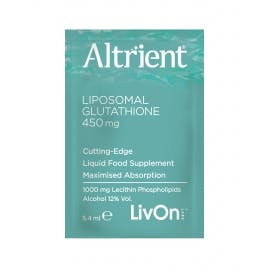Phospholipids: The smart way to support your brain
Phospholipids, together with other nutrients such as B vitamins are crucial to your brain function. With a little support from these essential fatty acids and co-factors, your brain can operate at its highest level and continue to fire on all cylinders well into a grand old age.
What are phospholipids?
In order for brain cells to perform all of their vital functions it is essential for hormones, neurotransmitters and other materials to be able to pass in and out of the cells. This requires a dynamic and flexible cell membrane, which is where phospholipids come in…
All lipids (fats) that contain phosphorous are called phospholipids and possess ‘amphiphilic’ properties, which enable them to arrange themselves into parallel layers forming a phospholipid bilayer that wraps around the cell creating a fully functioning cell membrane. This layer contains fatty acids such as phosphatidylcholine and phosphatidyl serine and acts as a semi-porous barrier between the cell contents and the outside environment. The cell membrane is critical to the cell’s ability to perform its many functions including:
Providing barriers to protect the cell
Regulating cellular processes related to growth and immune surveillance
Providing pathways for various substances to cross the membrane
Aiding and regulating transportation of materials and neurotransmitter signals
Assembling lipoproteins that are essential to the transportation of triglycerides and cholesterols in the blood.
Phospholipids are vital to the stability and fluidity of cell membranes and directly influence the brain chemistry that helps regulate mood, memory, concentration and understanding.
Cognitive function
Like all tissues, cell membranes are constantly being damaged and repaired. If damaged phospholipids are not replaced, the cell membranes start to deteriorate and the cell becomes progressively more dysfunctional and eventually dies. A high turnover of phospholipids is a critical supporting factor in helping the brain cells and brain function optimally. Research is proving this to be true, studies have identified that elderly patients suffering with Alzheimer’s disease tend to have depleted phospholipid levels in nerve cells within the brain. Phosphatidylcholine in particular is of great interest to researchers because of its impressive potential to support brain health. Its value comes from its involvement in the growth of new brain cells and neural connections, whilst also protecting brain and nerve cells.
Low levels of folic acid, vitamin B6 and B12 are also common amongst the elderly and have been linked to nerve cell damage. In some studies, supplementing with these particular B vitamins was shown to improve some aspects of intelligence in the elderly.
One should also bear in mind that the brain and related tissues are prime targets for oxidative damage because of the high levels of phospholipids found in brain cell membranes. Phospholipids are extremely vulnerable to free radical damage, which is frequently cited as a key factor in declining cognitive function and memory during ageing. With the increasing incidence of dementia and other cognitive impairments, a good supply of phospholipids, antioxidants and B vitamins is a helpful strategy worth considering.
Regulating mood
When it comes to mood balance omega 3 and omega 6 essential fatty acids are considered to be supportive. They are key components of phospholipids and constitute around 50% of the phospholipid bilayer of cell membranes. The essential fatty acids help with the membrane fluidity, crucially influencing the flow of hormones and nerve transmissions that regulate mood.
A deficiency in the essential fatty acids that make up the phospholipid membrane of brain cells has been shown to induce depression and anxiety. Studies have identified that there is a significant decrease in the ratio of omega 3 to omega 6 in those suffering from major depression. Fish such as salmon, mackerel, sardines, fresh tuna and herrings contain high levels of omega 3. There are also a number of other foods that help support mood these include:
Broccoli, green beans, pulses, lentils, beans and bananas are rich in chromium and B vitamins, which enhance mental processes.
Chicken and turkey as well as cottage cheese, oats, bananas and nuts contain tryptophan, which helps to support the production of serotonin – the happy hormone responsible for raising mood.
Flaxseed oil, flaxseeds and walnuts provide a vegetarian source of omega 3
Top 3 Supplements for supporting Brain Health
1. Phosphatidylcholine
Generally, our overall dietary intake of phospholipids has reduced significantly. As we age the rate of phospholipid production in the body declines and it’s not easy to get enough from the diet, particularly if you’re trying to reduce your meat consumption. Phosphatidylcholine is directly involved with acetylcholine synthesis, which is needed for cognition, learning and memory formation. Research shows that a single 25g dose of phosphatidylcholine significantly improves memory in just 90 minutes.
2. Glutathione
Antioxidants offer vital support for mental health and neurological conditions. The elderly generally have lower intakes of antioxidants, which are crucial for protecting phospholipids in the brain from free radical damage. Glutathione is especially important because of its powerful antioxidant effect in brain cells. Patients with cognitive impairments are seen to have compromised glutathione levels, making glutathione supplementation a potentially powerful therapy to consider.
3. B vitamins
An increasing body of research provides compelling evidence that low B vitamin status affects cognitive function. It also appears that B vitamin status plays a key role in age-related cognitive impairment and mental decline. Evidence of an association between low folate status and dementia/Alzheimer’s disease has consistently been shown in a number of studies. Furthermore, low circulating levels of vitamin B12 have also been linked to an increased risk of dementia and Alzheimer’s disease.
The distinct advantages of liposomal supplements
The liposomal encapsulation technology used in Altrient products uses essential phospholipids and includes a high percentage of phosphatidylcholine. So, when you take a good quality liposomal supplement like Altrient, you don’t just receive a source of the active ingredients encapsulated within the liposome, you also gain a therapeutic dose of phosphatidylcholine. Not only does an Altrient product provide you with highly bioavailable nutrients, it also delivers a source of phospholipids to help support cell membrane function, the perfect package for those looking to help support brain function.
Jacqueline Newson BSc (Hons) Nutritional Therapy
References
Alberts B, Johnson A, Lewis J, et al. Molecular Biology of the Cell. 4th edition. New York: Garland Science; 2002. The Lipid Bilayer. Available from: https://www.ncbi.nlm.nih.gov/books/NBK26871/.
Dotson JD. What are the primary functions of phospholipids? https://sciencing.com/primary-functions-phospholipids-7349125.html. [Accessed 18.1.19.]
Gulbins E et al. Review. Brain membrane lipids in major depression and anxiety disorders. Biochimica et Biophysica Acta (BBA) - Molecular and Cell Biology of Lipids. 2015; 1851,8: 1052-65.
https://www.foundationalmedicinereview.com/blog/glutathione-may-open-up-new-possibilities-for-the-treatment-of-cognitive-impairment [Accessed 21.1.19]
Ladd S.L., Sommer S.A., LaBerge S., Toscano W. “ Effect of phosphatidylcholine on explicit memory.” Clinical Neuropharmacology. 1993;16(6):540-9.
Morris MS. The Role of B Vitamins in Preventing and Treating Cognitive Impairment and Decline, Advances in Nutrition, Volume 3, Issue 6, 1 November 2012, Pages 801–812.
Van Hoogevest P and Wendel A. The use of natural and synthetic phospholipids as pharmaceutical excipients*. Eur J Lipid Sci Technol. 2014; 116(9): 1088–1107.
Young SN. How to increase serotonin in the human brain without drugs. J Psychiatry Neurosci. 2007; 32(6): 394–399.


.jpg?auto=format&q=45&w=262&trim=auto)
.jpg?auto=format&q=45&w=262&trim=auto)
